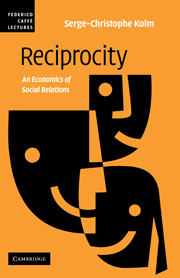Book contents
- Frontmatter
- Contents
- List of illustrations
- Foreword
- Introduction
- Part I Facts and forms
- Part II Motives
- Part III Values and reasons
- Part IV The economics of reciprocity
- 17 General methodology of reciprocity analysis
- 18 The theory of comparative, matching, or balance reciprocity
- 19 The theory of liking reciprocity
- 20 Strategic interaction and process preferences: games of reciprocity
- 21 General properties of processes
- 22 Solutions of reciprocity games; comparisons
- 23 Reciprocity in the understanding of society and its economy
- Bibliography
- Index
19 - The theory of liking reciprocity
Published online by Cambridge University Press: 22 September 2009
- Frontmatter
- Contents
- List of illustrations
- Foreword
- Introduction
- Part I Facts and forms
- Part II Motives
- Part III Values and reasons
- Part IV The economics of reciprocity
- 17 General methodology of reciprocity analysis
- 18 The theory of comparative, matching, or balance reciprocity
- 19 The theory of liking reciprocity
- 20 Strategic interaction and process preferences: games of reciprocity
- 21 General properties of processes
- 22 Solutions of reciprocity games; comparisons
- 23 Reciprocity in the understanding of society and its economy
- Bibliography
- Index
Summary
Liking reciprocity and comparative reciprocity
Liking reciprocity is reciprocity in which giving in return is motivated by liking. As we have seen in chapter 7, this liking results either from the initial giving, essentially when it is benevolent towards the beneficiary, or directly from the reciprocity in sentiments of reciprocal liking. In both cases, the motivation of the initial giver is essential. In balance reciprocity, in contrast, the motivation for giving in return is thoroughly different, and the motivation of the initial giving is a priori irrelevant. This motive for returning gifts is a “preference” for balance or matching, or deficit aversion (and, possibly, surplus seeking), whereas, in both types of liking reciprocity, giving in return is motivated by liking. These two families of reciprocity are thus inconsistent with one another, at least for strong forms of liking reciprocities: “L'amour ne compte pas” (He who loves does not count or “Love counts for all”), the dictum says, and love makes one give without seeking any kind of balance. One is also always “indebted” towards the loved one for her love or for her existence. However, for milder kinds of liking the two reciprocating sentiments and motives can be jointly present in the same person for the same return-gift. There can then be both liking and a preference for balance or for lower deficit – and surplus seeking may not be absent.
- Type
- Chapter
- Information
- ReciprocityAn Economics of Social Relations, pp. 262 - 282Publisher: Cambridge University PressPrint publication year: 2008



